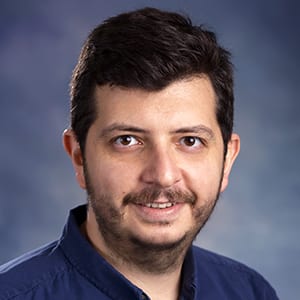Solar Flare Prediction from Time Series of Solar Magnetic Field Parameters
A Track in the IEEE Big Data 2019 Big Data Cup
Organizers
On behalf of the Data Mining Lab (dmlab.cs.gsu.edu), in the Department of Computer Science, Georgia State University, this challenge has been organized by the following.
Any issues or questions can be directed to dkempton1@cs.gsu.edu.

Dustin J. Kempton, Ph.D. (cs.gsu.edu/~dkempton1)
Office: 25 Park Place, Room 719Email: dkempton1@cs.gsu.edu
ORCID:
 orcid.org/0000-0002-1837-8365
orcid.org/0000-0002-1837-8365
Dustin Kempton is a postdoctoral research associate in the Department of Computer Science at Georgia State University (GSU), where he obtained his Ph.D. in 2018. As a member of the GSU Data Mining Laboratory (dmlab.cs.gsu.edu), Dr. Kempton has had his research sponsored by GSU’s Second Century Initiative through a fellowship in the Astroinformatics Research Cluster as well as by NSF and NASA grants. Dr. Kempton’s research focuses on several areas of management and analysis of a petabyte scale image dataset from NASA’s SDO solar telescope. He is currently focusing on time series prediction of infrequent but highly important events, content based image region indexing and retrieval, as well as developing distributed systems for processing and providing near real time querying of large image datasets. Previous research has also focused on tracking evolving spatiotemporal events in solar images as well as indexing said events for frequent pattern discovery.

Berkay Aydin, Ph.D (cs.gsu.edu/~baydin/)
Office: 25 Park Place, Room 740Email: baydin2@cs.gsu.edu
ORCID:
 orcid.org/0000-0002-9799-9265
orcid.org/0000-0002-9799-9265
Berkay Aydin is as a research assistant professor in the Department of Computer Science at Georgia State University (GSU), as part of the Next Generation – Astroinformatics Research Cluster program. He was a postdoctoral research associate at GSU prior to his current position, where his research was sponsored by NSF and NASA grants. Dr. Aydin’s research is interdisciplinary and focused on management, retrieval, and analysis of Solar Astronomy Big Data. Currently, he works on creating algorithms and data models for multivariate time series prediction and spatiotemporal frequent pattern discovery, which is helpful for understanding the implicit temporal and spatial relationships appearing among objects with spatial and temporal extents as well as forecasting extreme spaceweather events.

Rafal A. Angryk, Ph.D. (cs.gsu.edu/~rangryk)
Office: 25 Park Place, Room 751Email: angryk@cs.gsu.edu
Rafal Angryk received his M.S. and Ph.D. degrees in Computer Science in 2004 from Tulane University. Dr. Angryk also holds two other master’s degrees, which he obtained from universities in Poland. In 1999, Dr. Angryk received a M.A. in Business Management from the University of Szczecin and three years later an M.Eng. degree in Computer Science from the Technical University of Szczecin.
Dr. Angryk is currently employed as a Professor in the Computer Science Department at Georgia State University (GSU) and came to GSU as part of the university’s Second Century Initiative (2CI) to build nationally recognized scholarly strength and critical mass around common research themes. Before joining GSU in August 2013, he spent almost a decade as faculty at Montana State University. Dr. Angryk is the founding director of the MSU/GSU Data Mining Laboratory (dmlab.cs.gsu.edu), and holds the title of Affiliate Professor of Physics & Astronomy at GSU due to the interdisciplinary research he is conducting on massive repositories of solar data. Prior to arriving at MSU, he was involved in the National Geospatial-Intelligence Agency (NGA) project on Intelligent Database Agents for Geospatial Knowledge Integration and Management, administered by the Center for Computational Sciences in the Stennis Space Center (NASA). Dr. Angryk’s research and teaching interests lie in the areas of Very Large Databases (Spatial and Spatio-temporal Databases, and kNN Indexing of High Dimensional Data), Data Mining (Frequent Patterns Discovery, Clustering and Classification of real-life large-scale data), and Information Retrieval (Text and Image data). He has published over 100 journal articles, book chapters, and peer-reviewed conference papers in these areas. His research has been sponsored by several federal agencies: NASA (major contributor), NSF, NGA, as well as industry partners: Intergraph Corporation and RightNow Technologies (now Oracle), with the successful grant history exceeding $10M.